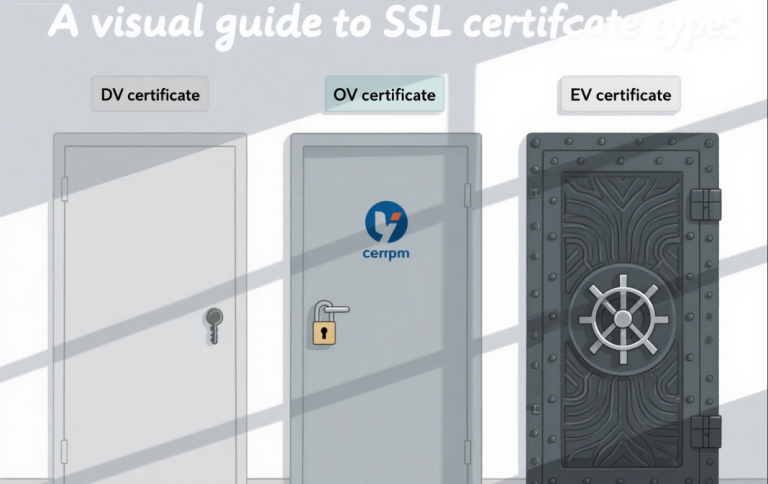
Wait, do you ever get that feeling of dread when you see a little red warning pop up in your browser? It says something cryptic like, "Your connection is not private," and suddenly your stomach drops. You were just trying to log in to your bank or make a purchase, and now a big red sign is telling you to stop. It’s a moment of instant confusion and distrust, isn’t it? That little red warning is a huge wake-up call, and it’s all tied to one small, often overlooked detail: the SSL certificate.
You might think an SSL certificate is just a small technical thing your web developer handles. After all, it's just a digital file that enables HTTPS, right? But that's like saying a key is just a piece of metal. It's the key to your business's trustworthiness, reputation, and, ultimately, survival in the digital world. For a small business, this isn't just about a green padlock icon; it’s about a direct signal to your customers: "We are safe. We are legitimate. You can trust us with your information." Ignoring this is like building a beautiful storefront and then leaving the cash register out on the sidewalk. You wouldn't do that, would you?
So, how do you navigate this world of digital keys and locks? It feels overwhelming, with all the acronyms flying around—DV, OV, EV, Wildcard. It's a sudden burst of complexity, but don't worry. We're going to break it down, step by step, so you can confidently choose the right certificate for your small business and start building that critical trust.
The Three Doors of Trust: Understanding Validation Levels
At its core, an SSL certificate is a key that encrypts data between your website and your visitor. But not all keys are created equal. They come with different levels of validation, and this is where you need to pay close attention. Think of these validation levels as different types of security checks for your website, each one providing a different degree of assurance to your customers.
1. The Quickest Handshake: Domain Validation (DV) Certificates
This is the most basic level of SSL security. For a DV certificate, the Certificate Authority (CA) simply verifies that you own or control the domain name you are requesting the certificate for. They'll send an email to an address associated with the domain, or you'll place a specific file on your web server. It's fast, automated, and cheap (or even free!). You can get a DV certificate in minutes.
Who is it for? If you have a personal blog, a simple informational website, or a hobby project where you aren't handling sensitive customer data or payments, a DV certificate is a perfect fit. It gets you that crucial green padlock and enables HTTPS, which is a must for Google's SEO rankings. It's the equivalent of putting a basic lock on your front door. It's good enough for most things, but it's not a bank vault.
The Pro & Con: The big pro is the speed and ease of acquisition. The con is that it provides zero information about your business. A potential visitor has no idea if the site is run by a legitimate company or just some guy in a basement.
2. The Business ID Check: Organization Validation (OV) Certificates
This is where things get a little more serious. To get an OV certificate, the CA doesn't just verify your domain ownership; they also verify your business's legal existence. They'll check public records, business registration databases, and other official sources to confirm that you are a real, legally registered organization. This process takes a few days.
Who is it for? If you're an e-commerce store, a professional services firm, or any business that collects customer information and wants to show a higher level of trust, an OV certificate is your sweet spot. The customer can click on the padlock icon and see your company's name and address listed right there. This subtle piece of information makes a huge difference in establishing legitimacy and trust. It's like putting a business sign with your official name on the front of your store—it tells people who you are and that you're an official entity.
The Pro & Con: The pro is the increased trust and legitimacy it provides. The con is the slightly longer validation process and higher cost compared to a DV certificate.
3. The Gold Standard: Extended Validation (EV) Certificates
This is the highest level of security and trust available. Getting an EV certificate is an extensive process. The CA not only verifies your domain and legal existence but also conducts a thorough, in-depth check of your business. They will verify your physical address, phone number, and even your legal standing with the government. This rigorous process can take a few weeks to complete.
Who is it for? EV certificates are for major e-commerce platforms, banks, financial institutions, and any business that absolutely, positively needs to convey the highest level of trust and authenticity. The result of this process used to be a green address bar showing your company name, which was a clear visual signal to customers that they were on a highly secure and verified site. While modern browsers have moved away from the green bar, the trust signals and backend verifications still make it the industry gold standard.
The Pro & Con: The pro is the unparalleled level of trust and credibility it provides. It's the equivalent of a multi-layer security system with armed guards at the bank vault. The con is the higher cost and the lengthy, rigorous validation process.
One Certificate, Many Sites: The Wildcard and Multi-Domain Options
What if your business has multiple subdomains? Maybe your main site is www.yourbusiness.com, but you also have a blog at blog.yourbusiness.com and a support portal at support.yourbusiness.com. Are you supposed to buy a separate SSL certificate for each one? That would be a headache and a waste of money.
This is where Wildcard SSL certificates come in. A Wildcard certificate is a single certificate that secures your main domain and an unlimited number of its subdomains. It uses a simple asterisk (*) in front of your domain name (e.g., *.yourbusiness.com). It's a game-changer for businesses with complex site structures. Think of it as a master key that fits all the doors on your property.
What about a business that has entirely separate domain names, like yourbusiness.com and yourbusiness-shop.com? For that, you need a Multi-Domain SSL certificate. These certificates can secure multiple, distinct domains under a single certificate. It's more convenient than managing separate certificates for each site.
What About My Customer’s Data? Protecting Sensitive Information
Let's get back to the core purpose. Why does all of this matter for a small business? Because you are the keeper of your customers’ data. Every piece of information they provide, from their email address to their credit card number, is a trust deposit. A secure connection, enabled by a robust SSL certificate, encrypts that data as it travels from their browser to your server. Without it, that information is like an open postcard, visible to anyone who intercepts it.
Google's message is loud and clear: sites without SSL are insecure. Browsers like Chrome now actively warn users when they visit an HTTP site. For a small business, that little red warning is a death sentence. It tells a potential customer, “Go elsewhere.” Even if you don’t handle payments directly, you are still collecting information through contact forms, newsletter sign-ups, and login portals. All of this needs to be secured. A proper SSL certificate is your way of saying, "We take your privacy seriously."
Making the Right Choice: A Practical Checklist
Alright, let's put it all together. How do you make the right choice? Ask yourself these simple questions:
What is my website's purpose?
Simple blog or personal site? A DV certificate is likely all you need.
E-commerce store or professional site? An OV certificate provides the best balance of trust and cost. It’s the sweet spot for most small businesses.
Financial institution or high-profile brand? An EV certificate is the gold standard for your industry.
Do I have multiple subdomains or separate domains?
Many subdomains? Go for a Wildcard certificate.
Multiple distinct domains? A Multi-Domain certificate will save you a lot of hassle.
Don't let the technical jargon confuse you. Think of an SSL certificate as a badge of honor, a public declaration of your commitment to security and trustworthiness. You're not just buying a file; you're investing in your brand's reputation and your customers' peace of mind. Without it, you’re just leaving the door wide open. With it, you're building a fortress of trust that will help your small business thrive.

